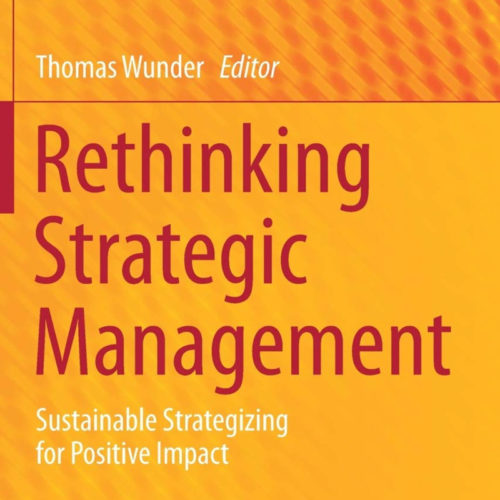
The next level of sustainability requires strong strategical leadership
and effective management systems

“This book offers innovative ideas and frameworks for sustainable strategizing to advance business by scaling-up its positive impact, which is so urgently needed at this time in the 21st century. It shows practitioners how to effectively deal with socio-ecological systems’ disruptions to their operating environments and play an active role in transforming markets toward a sustainable future.
In short, the book demonstrates how to make business sense of sustainability, highlighting new approaches and examples that translate sustainability into strategy and action. The ultimate goal is to provide a path toward a thriving future for both business and society.”
Cham, CH: Springer Nature 2019.






The 4th International Conference on New Business Models hosted by Florian Lüdeke-Freund and his Chair for Corporate Sustainability at ESCP Europe Berlin brought together 186 business model and sustainability experts from 30+ countries. See the ABC Panel Discussion on „Rethinking Strategic Management: Can business lead the way to a sustainable future?“ led by Thomas Wunder.
All publications are in German if not stated otherwise.
You will get access to selected publications upon request via publications@sustainup.com
Journal of Strategy and Management, Vol. 14 (2021), No. 3, pp. 331-351
The authors adapt the “wedding cake” model of Sustainability Development Goals (SDGs) and their relationships to the concept of “dynamic materiality” in both an organizational as well as a macro perspective. In addition, the authors introduce the word sustilience to describe an organization’s combined ability to achieve “sustainability” through relatively stable conditions as well as the “resilience” to rebound after major external shocks.
Zeitschrift Fuehrung + Organisation (zfo), vol. 90 (2021), no. 3, pp. 178-182
Sustainability has become a social and political trend with pull effect that companies cannot ignore any longer. This is confirmed by the regulatory requirements for a sustainable development on an international and national level as well as by changing stakeholder expectations. Established business models are under high scrutiny and must be evaluated systematically for their future viability by companies, investors and banks.
Disruptive socioecological developments put established business models to the test. Much that was previously non-transparent and for free becomes comprehensible and expensive in future. Purpose could be an emotional driver for the necessary transformation process. Embedded in the company in a way that is relevant to decision-making, purpose helps to overcome structural and cultural inertia.
The two key transformation drivers digitalization and sustainability evolve rapidly, emerge simultaneously and are potentially disruptive. Companies can integrate and control them in sustainable data-based business ecosystems. Thus, they create economic, ecological and social value as a basis for future competitive advantages, as presented in this article.
Digitalization and sustainability are the key transformation drivers today.
Intelligently interlinking economic, ecological and social value creation is a strategic opportunity for ensuring the viability of a company – as well as of society.
For further publications click here.


